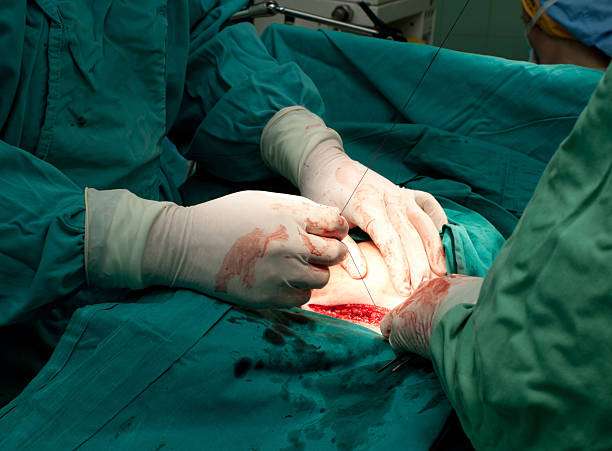“Do you know what is the biggest cause of losing life and spreading like a pandemic? It’s obesity”, says Dr Harsh Sheth. “Obesity in a person leads to a series of health issues that can eventually take your life but prior to that, it takes your quality of life. Simple things like sitting, standing, sleeping, and even breathing doesn’t come easy for morbidly obese people. Even though the doctors suggest weight loss, it is easier said than done. Controlling one’s appetite and sticking to an exercise routine takes multiple cycles of success and failure”.
After multiple failed weight loss attempts, surgeons recommends bariatric surgery to assist a patient to lose weight.
Not many patients take recommendations into consideration due to multiple factors, primarily the fear of surgery. The thought of having the entire abdomen open for the surgery is terrifying. As also the fear of a prolonged recovery or an unforeseen complication.
But, the invention of Laparoscopic surgery has changed the entire scenario.
Laparoscopy is a minimally invasive surgery used to carry out procedures in your abdomen for diagnosis and treatment. Dr Harsh Sheth, a bariatric and GI laparoscopy surgeon in Mumbai, uses Laparoscopy for detailed investigations and surgeries of a patient.
Dr. Harsh describes why laparoscopic bariatric surgical procedures have led to a wider acceptance of surgical treatment for obesity. He gives detailed information about the Laparoscopy: before and after the procedure, to mentally prepare a patient of the possible outcomes.
Read on to have complete information on the procedure. It will help you with your decision making to undergo laparoscopic surgery in Mumbai under Dr. Harsh Sheth.

What Happens before laparoscopy?
Dr Harsh says,” When you approach a GI specialist for your abdominal discomforts, your doctor will take note of your symptoms. So, the daunting task of undergoing various tests to determine the source of discomfort starts post the physical examination.”
Once the tests are conducted – based on the reports, a further plan of action sets into place.
Well, luckily – it isn’t as risky as decades ago, when conventional open surgery was the only option. Most procedures conducted in the current times are done using Laparoscopy.
Before the Laparoscopy procedure, the doctor will advise you on the following:
Based on the procedure being performed, you will be fasting for 8 hrs before the surgery.
- You will be off any anticoagulants or blood thinners for at least 3-4 days before the procedure.
- Cessation of smoking and drinking is a must, as it delays healing and could lead to infection during the recovery period.
- You may or may not be able to leave the hospital on the same day of the procedure, so prepare a bag if you need to stay in the hospital. And have someone accompany you in case you can leave the same day since the effects of anaesthesia do take time to wear off.
The Procedure of Laparoscopy:
“We prefer to put a patient under general anaesthesia to ensure a smooth post-operative outcome,” says Dr Harsh.
The procedure after that is almost standard in most abdominal surgeries using Laparoscopy.
- A small incision of 1 to 1.2 cm is made near the belly button and a trocar with a cannula is inserted.
- CO2 gas is passed through the trocar to inflate the abdomen. This gives more room to work and greater visibility.
- A laparoscope is inserted through the same tube to relay images on a screen.
- Your doctor investigates the troubled organs and performs the surgery to treat them. This is done by making another small incision through which another arm of the laparoscope is inserted. Instruments are passed through this arm to carry out the surgery.
- Once the surgery is completed, the CO2 is sucked out, and the incisions are closed and bandaged.
- The length of the surgery depends on the kind of procedure – an investigative procedure takes about 30 minutes and corrective surgery more than that.
After the Laparoscopic surgery:
Once fully awake, you will eat and drink some easily digestible foods, and your excretion is monitored. You should be able to pass urine and gas comfortably.
Some standard post-operative instructions will be explained in detail like:
Keeping your wound clean.
You will be prescribed medicines to keep infections and swelling in check.
Look for signs of infection like fever, pain, or oozing, and contact your surgeon asap if you find them.
You may find some pain and discomfort in your shoulders but observe it. It should pass in a day, since it is the effect of the residual CO2 in the abdominal cavity.
Gentle movement throughout the day at regular intervals, like slow walks, is a must for the wound to heal naturally and avoid adhesions; however, steer clear of excessively strenuous activities for 3 months.
Make sure to rest well. Your recovery ultimately depends on what corrective surgery procedure you have undergone.
What difference do you find before and after the laparoscopy procedure?
If you have undergone a laparoscopic bariatric surgery – you will have a reduced appetite and will feel weak and tired, due to restricted food intake in the initial few days. You will be required to eat smaller portions of nutritious food at regular intervals to keep digestion quick and complete.

